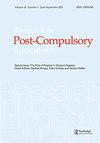生得太晚了?相对年龄如何影响大学入学模式
IF 0.9
Q3 EDUCATION & EDUCATIONAL RESEARCH
引用次数: 0
摘要
摘要我们出生的月份会影响我们在教育系统中的经历和进步,这被称为相对年龄效应。这项研究报告了一个项目,在该项目中,作者对不同出生月份对英国继续教育的入学模式和参与者体验的影响进行了混合方法研究,而英国是该研究领域被忽视的部门。这篇论文挑战了目前的观点,即在学年队列中出生较晚的负面影响会随着年龄的增长而消散。对研究结果的分析表明,在这项研究中,进入继续教育学院的学生的入学模式偏向于夏季月份,5月份应该包括在夏季月份的定义中。夏季出生的研究参与者在社会和身体层面上都知道自己的相对年龄,但与学业进步无关。本文认为,相对年龄是入学率以及随后在继续教育中表现的重要驱动因素,应与其他已知的不利因素一起监测,以减少和消除这种系统性不利因素。本文章由计算机程序翻译,如有差异,请以英文原文为准。
Born too late? How relative age affects college enrolment patterns
ABSTRACT The month in which we are born affects our experience of and progress through the education system and is known as the relative age effect. This study reports on a project in which the author conducted mixed methods research into the impact of different birth months on enrolment patterns and participant experiences within further education in England, a neglected sector for this research area. This paper challenges the current view that the negative impact of being born later in an academic year cohort dissipates with age. Analysis of the findings shows that enrolment patterns are skewed towards the summer months for those entering the further education college in the study and that the month of May should be included in the definition of summer months. Summer-born study participants were aware of their relative age at a social and physical level, but made no connection to their academic progress. This paper argues that relative age is a significant driver for enrolment to and, therefore, subsequent performance within further education, which should be monitored alongside other better known disadvantage factors, with the aim to reduce and eliminate this systemic disadvantage.
求助全文
通过发布文献求助,成功后即可免费获取论文全文。
去求助
来源期刊

Research in Post-Compulsory Education
EDUCATION & EDUCATIONAL RESEARCH-
CiteScore
1.30
自引率
14.30%
发文量
31
期刊介绍:
Throughout the world, there is a growing awareness of the significance of vocational and post-compulsory education and training systems. The majority of countries are working hard to develop their provision, recognising the importance of post-compulsory education in providing educated and skilled people in sufficient numbers at appropriate levels to assist economic and social development. Research in Post-Compulsory Education, sponsored by the United Kingdom"s Further Education Research Association (FERA), recognises the need for more international research and analysis and the generation of relevant theory in order to identify policy needs and trends as well as priorities in this growing area.
 求助内容:
求助内容: 应助结果提醒方式:
应助结果提醒方式:


